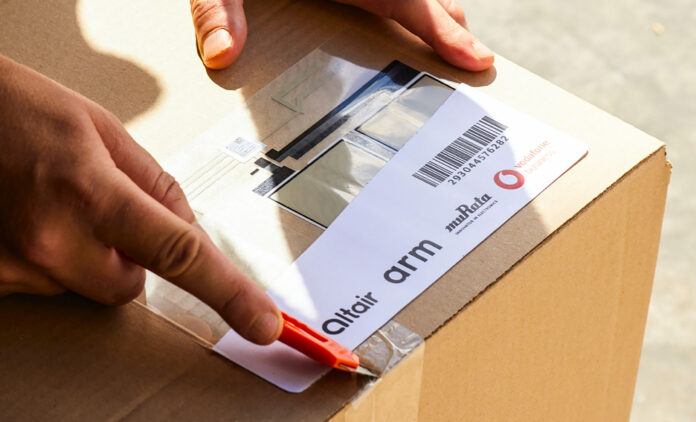Vodafone appears to be putting renewed effort into its commercial smart-label product, developed originally by Sony Semiconductor, in combination with SIM specialist Kigen and module maker Murata, and supplied initially as a proof-of-concept with cellular IoT airtime from Vodafone into German pharmaceuticals firm Bayer a couple of years back. The pioneering work on the product, a printable IoT label with useful IoT sensors, did more than any equivalent solution to create a new category of mass-market IoT trackers for the supply-chain industry.
The business division of UK-based Vodafone has published a note about a developing commercial partnership with Sensos, which emerged some months back as a spinoff vehicle from Sony’s Israeli semiconductor business (formerly Altair) to further develop the smart label device. Since then, DB Schenker, the logistics division of German rail firm Deutsche Bahn, has taken the smart-label solution from Sensos (and possibly Vodafone?) to track small freight consignments globally.
In parallel, Dutch IoT hardware firm SODAQ has teamed up with UK enterprise IoT provider Pod Group, part of identity and security solution vendor Giesecke+Devrient (G+D), to deploy a cellular IoT smart label with system integrator Lufthansa Industry Solutions. The trio showed what they called the “first commercial smart label tracking device” at CES in January; a “paper thin” printable label with an LTE-M transceiver, a 3D-printed alkaline battery, and temperature and motion sensors. The whole package is recyclable, they contend.
All of which makes Vodafone’s latest utterances about its partnership with Sensos a little overdue, having raised such an excited commotion about the smart-label concept way back in 2020. The understanding is the Bayer trial reached commercial rollout, and continues; the DB Schenker solution sounds likely (!) to connect via Vodafone’s cellular IoT networks (and roaming networks). There is nothing in its new blog about new customers; it just says the Sensos deal is ready to roll (“revolutionising supply chain logistics”).
Vodafone is calling the smart label a ‘connected label’, and pitching it as an “end-to-end” and “plug-and-play” solution, which “replaces a conventional parcel label with enhanced capabilities”. Its Sensos-made label features dual-mode NB-IoT and LTE-M transceivers, an integrated SIM (iSIM), plus sensors to monitor ambient temperature, motion, and any tampering with the package. All of these aspects are familiar already, from the solutions supplied to Bayer and DB Schenker.
But Vodafone is also now leaning on its own IoT management capabilities, presented in its Tracking Console cloud application. It states: “[The] innovation lies in the improved transparency and granularity… [It brings] a combination of innovative space saving and power reduction capabilities… within [an] innovative form factor… A combination of user-friendly dashboards that enable better decision-making, an alert system with automatic notifications… and advanced data management set the standard for modern systems integration as well as high-value asset [tracking].”
The question is: how much of the software solution is by Vodafone, and how much is by Sensos – because talking about the hush-hush Sensos project with industry types at IoT Solutions World Congress in Barcelona in February, the word was Sony Semiconductor had been working to develop an ‘end-to-end’ label proposition. Whether it has been white-labelled by Vodafone, as Sensos’ first and best partner on the project, or whether it remains in-development, or in the background, is unclear.
Sony Semiconductor was saying little at the event, and has said little about it since. Strange, for such an iconic IoT innovation story.

